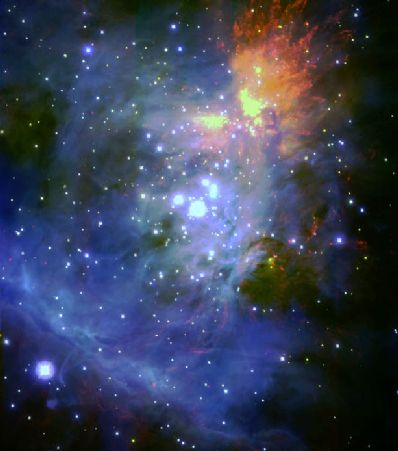Space EnvironmentWhat is in space? |
There are about 6000 stars that are clearly visible to the naked eye above Earth. Yet we know that there are millions of stars in the universe. Since all stars are putting out light and other kinds of electromagnetic radiation and since light can travel for huge distances in space, why can't we see all the stars?
All stars, like our Sun, send out a huge amount of electromagnetic radiation, including light. However, that light spreads out with distance, making it so that only a tiny fraction reaches us. In addition, depending on the temperature of the star, the main color of light sent out by the star changes. Cooler stars put out redder light, hotter stars put out blue or white light. Generally, colors like white or blue are stronger colors (shorter wavelength, higher frequency) and can be seen more easily at far distances than reds, oranges or yellows. Also, some stars are simply larger than others and send out more light.

A star field, as seen from the Hubble telescope, showing different colored stars.
The circled star is a white dwarf star, which will send out a small amount of
strong light. Image from the Space Telescope Science Institute http://oposite.stsci.edu/pubinfo/SubjectT.html
In addition to all the stars in space, there is a lot of other matter, called dark matter, between us and the stars that can block starlight. This dark matter can include nebulae which are clouds of gas, interstellar dust or planets.

A view of the Orion nebula, as seen from the Subaru Telescope. . The stars behind
it can be seen dimly, if at all. From NASA's Astronomy Picture of the Day
Archive. http://antwrp.gsfc.nasa.gov/apod/ap990202.html
Finally light can be pulled aside by gravity. Black holes, which are massive gravitational centers, have gravity so strong that they will pull in light itself and trap it there, keeping it from getting to us.
![]()
What is in space besides planets and stars?
What is gravity?
What is energy?
What is frequency?
What is wavelength?
![]()
What are planets made of?
What are stars made of?
What is interstellar dust?
What is electromagnetic radiation?
How are frequency and wavelength related?
![]()
How do we know what's in space?
Why do mass and distance affect gravity?
Where does energy come from and go?
What makes EM radiation?
![]()